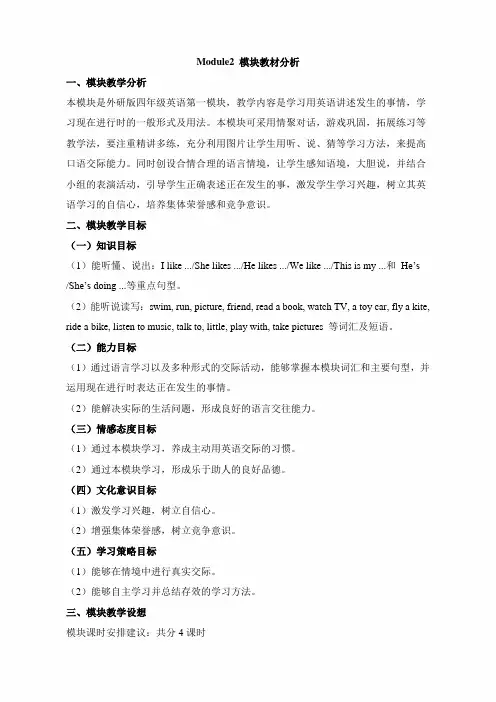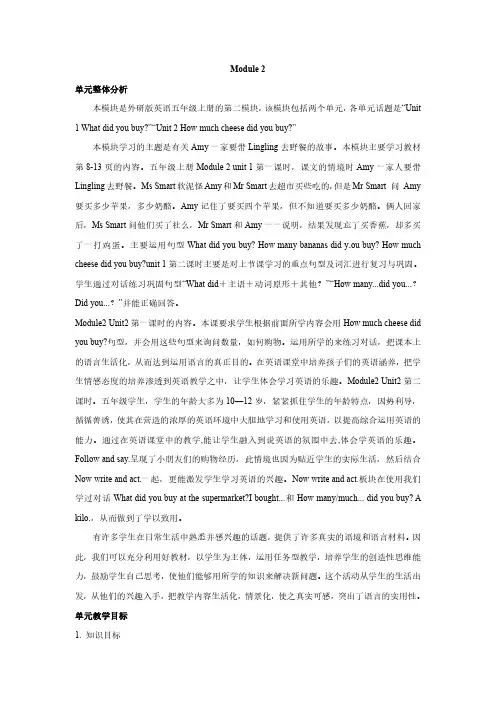Module 2教案
- 格式:doc
- 大小:38.50 KB
- 文档页数:4

外研版九年级英语上模块二教案篇一:外研版九年级英语上模块二教案Module 2 Great books王爱霞一、教学内容分析本模块的话题是谈论书、作家、思想家、戏剧、电影、诗歌等。
语法是一般现在时被动语态。
二、学情分析谈论书、作家、思想家等是学生感兴趣的话题。
本模块的学习是通过该话题的讨论,学习并掌握一般现在时被动语态的肯定句、否定句、一般疑问句和特殊疑问句。
三、教学目标1、语言知识目标:● 功能:谈论书、作家、思想家等。
● 词汇:1)能正确使用下列单词:work,influence,respect,wise,literature,behaviour,cave,freedom,funeral,social,theme,treasure,clever ,dead,pleased, alive, southern, state.2) 理解下列单词:thinker, monthly, outsider, version, historical,editor, publisher, reviewer.3)能准确理解并使用下列词组;as far as,not?anymore,millions of,run away, grow up, talk about, be known as/for● 语法:一般现在时被动语态。
2、语言技能目标听:通过听进行单词和图片的配对。
说:谈论最喜欢的书、戏剧、诗歌和作家等。
读:能读懂对书、作家、思想家等作介绍的文章,能掌握从文章到表格的信息转移。
写:写一本自己最喜欢的书。
3、情感目标:培养学生阅读的习惯,提高个人文化修养。
4、文化意识目标:了解中外著名的作家、思想家、诗人及他们的作品。
四、教学重点、难点重点:key vocabulary___work,influence,wise,clever,behaviour,dead,alive,treasuretheme, southern,as far as,not?any more,millions of,run away,grow up,talk about, be known as/for难点:被动语态的构成和用法,主动语态如何改为被动语态。

六年级上册英语教案Module 2 外研社(三起)教学内容本模块为外研社六年级上册英语Module 2,主题围绕“Festivals and Celebrations”。
教学内容包括:介绍中西方节日,如春节、圣诞节等;学习相关的词汇和句型,如“festival”, “celebration”, “We celebrate ”等;以及通过听、说、读、写等多种方式,提高学生的英语综合运用能力。
教学目标1. 知识与技能:学生能够掌握本模块的词汇和句型,并能用英语介绍中西方的节日。
2. 过程与方法:通过小组讨论、角色扮演等活动,提高学生的英语口语表达能力和团队合作能力。
3. 情感态度价值观:培养学生对多元文化的尊重和理解,增强学生的跨文化交际意识。
教学难点1. 词汇的记忆和应用:本模块涉及较多的节日相关词汇,学生需要通过记忆和理解,能够在实际情境中正确使用。
2. 句型的构造和运用:学生需要掌握介绍节日的句型,并能灵活运用到口语和写作中。
教具学具准备1. 教具:PPT、录音机、黑板、粉笔等。
2. 学具:英语课本、笔记本、彩色笔等。
教学过程1. 导入:通过播放英文歌曲“Happy New Year”,引入本模块的主题“Festivals and Celebrations”。
2. 新课内容:讲解本模块的词汇和句型,通过PPT展示相关的图片和例句,帮助学生理解和记忆。
3. 小组活动:学生分组,每组选择一个节日,用英语介绍该节日的庆祝方式和习俗。
4. 角色扮演:学生模拟在外国朋友家中过节的场景,用英语进行交流和互动。
板书设计1. Module 2 Festivals and Celebrations2. 重点词汇:festival, celebration, tradition, custom, celebrate, gather, lantern, decorate, significant, folk, ancestor, ghost, valuable, ceremony, honor, harvest, lively, celebrate, independence, peace, rebirth, prosperity, traditional, cultural, ritual,焰火,庙会,鞭炮,赏月,团圆,丰收,感恩,革命,和平,自由,春天,繁荣,传统,文化,仪式3. 重点句型:We celebrate , People gather to , Houses are decorated with , It is significant because , Ancestors are honored , People wish in the new year.作业设计1. 写一篇短文,介绍你最喜欢的节日,包括节日的庆祝方式和习俗。


外研版(一起)二年级英语上册《Module 2 Unit 2》教案设计一、教学目标1. 知识与技能目标:学生能够听懂、会说、会读本课的单词和句子;学生能够理解并在实际情景中运用句型“Can I ?”和“Yes, you can./ No, you can’t.”;学生能够理解一般疑问句的意义和用法。
2. 过程与方法目标:通过听、说、读、写的活动,培养学生的英语听说能力和阅读能力;通过小组合作和角色扮演,培养学生的合作能力和表达能力。
3. 情感态度与价值观目标:激发学生学习英语的兴趣和积极性;培养学生的自信心和自主学习能力;培养学生尊重他人、礼貌待人的良好品质。
二、教学内容1. 词汇:ball, toy, bag, book, ruler, pencil, pen, pencilcase, crayon, tape, scissors, gluestick, eraser, Sharpener, can, can’t。
2. 句型:Can I ?Yes, you can./ No, you can’t.3. 功能:询问并回答是否可以做某事。
三、教学重点与难点1. 教学重点:词汇的学习和记忆;句型的理解和运用。
2. 教学难点:一般疑问句的意义和用法;词汇的发音和书写。
四、教具与学具准备1. 教具:PPT、录音机、教学卡片、黑板、粉笔。
2. 学具:英语课本、练习本、铅笔、彩色笔。
五、教学过程1. 导入:通过唱英文歌曲或做游戏,激发学生的学习兴趣,营造轻松愉快的学习氛围。
2. 新课展示:通过PPT展示本课的词汇和句型,让学生听录音并跟读,帮助学生理解并记忆。
3. 操练:通过小组合作和角色扮演,让学生在实际情景中运用本课的词汇和句型,培养学生的合作能力和表达能力。
4. 巩固:通过听、说、读、写的活动,巩固学生对本课词汇和句型的理解和运用。
六、板书设计1. Module 2 Unit 22. 词汇:ball, toy, bag, book, ruler, pencil, pen, pencilcase, crayon, tape, scissors, gluestick, eraser, Sharpener, can, can’t.3. 句型:Can I ?Yes, you can./ No, you can’t.七、作业设计1. 听力练习:听录音,选择正确的图片。

Module2 模块教材分析一、模块教学分析本模块是外研版四年级英语第一模块,教学内容是学习用英语讲述发生的事情,学习现在进行时的一般形式及用法。
本模块可采用情聚对话,游戏巩固,拓展练习等教学法,要注重精讲多练,充分利用图片让学生用听、说、猜等学习方法,来提高口语交际能力。
同时创设合情合理的语言情境,让学生感知语境,大胆说,并结合小组的表演活动,引导学生正确表述正在发生的事,激发学生学习兴趣,树立其英语学习的自信心,培养集体荣誉感和竞争意识。
二、模块教学目标(一)知识目标(1)能听懂、说出:I like .../She likes .../He likes .../We like .../This is my ...和He’s /She’s doing ...等重点句型。
(2)能听说读写:swim, run, picture, friend, read a book, watch TV, a toy car, fly a kite, ride a bike, listen to music, talk to, little, play with, take pictures 等词汇及短语。
(二)能力目标(1)通过语言学习以及多种形式的交际活动,能够掌握本模块词汇和主要句型,并运用现在进行时表达正在发生的事情。
(2)能解决实际的生活问题,形成良好的语言交往能力。
(三)情感态度目标(1)通过本模块学习,养成主动用英语交际的习惯。
(2)通过本模块学习,形成乐于助人的良好品德。
(四)文化意识目标(1)激发学习兴趣,树立自信心。
(2)增强集体荣誉感,树立竞争意识。
(五)学习策略目标(1)能够在情境中进行真实交际。
(2)能够自主学习并总结存效的学习方法。
三、模块教学设想模块课时安排建议:共分4课时第一课时:Unit1 She’s reading a book.1. Listen, point and say.2. Listen, point and find“-ing”第二课时:Unit1 She’s reading a book.3. Listen and say.4. Practise.第三课时Unit 2 What are you doing?1. Listen and chant.2. Listen and say.3. Listen and match. Then say.第四课时:Unit 2 What are you doing?4. Listen and say. Then sing and do the actions.5. Mime, ask and answer.6. Do and say.。


三起五年级Module2Shopping教案一、教学目标1.让学生掌握本课的生词和短语,如:shop,buy,sell,expensive,cheap,howmuch等。
2.让学生学会用英语询问价格和购物,能熟练运用句型"Howmuchis/are?"和"It's/They'reyuan."进行交际。
3.培养学生的观察、分析和表达能力,激发他们对英语学习的兴趣。
二、教学重难点1.重点:生词和短语的掌握,句型的运用。
2.难点:询问价格和购物时的交际策略。
三、教学准备1.教学课件2.生词卡片3.情景图片四、教学过程Step1:导入1.利用课件展示一幅商店的图片,引导学生谈论商店里的物品。
2.学生自由发言,教师选取部分答案进行板书。
Step2:生词学习1.教师展示生词卡片,引导学生学习本课的生词。
2.学生跟读生词,教师纠正发音。
3.学生进行小组讨论,用生词造句。
Step3:对话学习1.教师播放本课对话,学生听后回答问题。
2.教师引导学生分角色朗读对话,注意语音语调。
3.学生进行小组对话练习,教师巡回指导。
Step4:语法学习1.教师引导学生观察对话中的句型"Howmuchis/are?"和"It's/They'reyuan.",让学生了解其用法。
2.学生进行句型练习,教师纠正错误。
3.学生用所学句型进行购物场景的模拟对话。
Step5:情景练习1.教师出示情景图片,学生分组进行购物对话练习。
2.学生自由选择角色,进行购物场景的模拟对话。
3.教师选取几组学生进行展示,给予评价和指导。
Step6:小组活动1.教师提出任务:设计一个购物场景,用所学句型进行对话。
2.学生分组讨论,完成购物场景的设计。
3.各组学生进行展示,其他学生认真倾听,给予评价。
2.学生进行拓展活动:用英语编写购物对话,进行角色扮演。



Module2单元整体分析本模块是外研版英语五年级上册的第二模块,该模块包括两个单元,各单元话题是“Unit 1What did you buy?”“Unit2How much cheese did you buy?”本模块学习的主题是有关Amy一家要带Lingling去野餐的故事。
本模块主要学习教材第8-13页的内容。
五年级上册Module2unit1第一课时,课文的情境时Amy一家人要带Lingling去野餐。
Ms Smart软泥怪Amy和Mr Smart去超市买些吃的,但是Mr Smart问Amy 要买多少苹果,多少奶酪。
Amy记住了要买四个苹果,但不知道要买多少奶酪。
俩人回家后,Ms Smart问他们买了社么,Mr Smart和Amy一一说明,结果发现忘了买香蕉,却多买了一打鸡蛋。
主要运用句型What did you buy?How many bananas did y ou buy?How much cheese did you buy?unit1第二课时主要是对上节课学习的重点句型及词汇进行复习与巩固。
学生通过对话练习巩固句型“What did+主语+动词原形+其他?”“How many...did you...?Did you...?”并能正确回答。
Module2Unit2第一课时的内容。
本课要求学生根据前面所学内容会用How much cheese did you buy?句型,并会用这些句型来询问数量,如何购物。
运用所学的来练习对话,把课本上的语言生活化,从而达到运用语言的真正目的。
在英语课堂中培养孩子们的英语涵养,把学生情感态度的培养渗透到英语教学之中,让学生体会学习英语的乐趣。
Module2Unit2第二课时。
五年级学生,学生的年龄大多为10—12岁,紧紧抓住学生的年龄特点,因势利导,循循善诱,使其在营造的浓厚的英语环境中大胆地学习和使用英语,以提高综合运用英语的能力。
通过在英语课堂中的教学,能让学生融入到说英语的氛围中去,体会学英语的乐趣。

教案:四年级上册英语教案-Module 2《My house》|教科版(广州深圳)教学目标:1. 能听懂、会说、会读本模块中的核心单词和句型。
2. 能运用所学单词和句型介绍自己的家和家庭成员。
3. 培养学生的观察能力和表达能力。
教学内容:1. 单词:room, bathroom, kitchen, living room, bedroom, family, brother, sister, father, mother2. 句型:What's this? It's What's that? It's Is this your ? Yes, it is. No, it isn't.教学重点与难点:1. 重点:掌握本模块中的核心单词和句型,能运用所学单词和句型进行简单的交流。
2. 难点:单词的准确发音和拼写,句型的运用。
教具与学具准备:1. 教具:图片、卡片、房子模型等。
2. 学具:学生自带照片、家庭作业等。
教学过程:Step 1: 热身(5分钟)1. 教师与学生用英语进行简单的问候,询问学生昨天做了什么。
2. 学生自由交流,教师引导学生用英语表达。
Step 2: 引入(10分钟)1. 教师出示一张房子的图片,引导学生说出房子里的物品。
2. 学生尝试用英语表达,教师给予鼓励和纠正。
Step 3: 呈现(10分钟)1. 教师出示单词卡片,引导学生说出单词。
2. 学生跟读,教师纠正发音。
Step 4: 练习(10分钟)1. 教师引导学生进行小组活动,用所学单词和句型介绍自己的家和家庭成员。
2. 学生互相交流,教师巡回指导。
Step 5: 巩固(10分钟)1. 教师出示一张家庭照片,引导学生用英语描述家庭成员。
2. 学生尝试用英语表达,教师给予鼓励和纠正。
Step 6: 作业布置(5分钟)1. 教师布置作业:用所学单词和句型写一篇关于自己家的短文。
板书设计:1. 单词:room, bathroom, kitchen, living room, bedroom, family, brother, sister, father, mother2. 句型:What's this? It's What's that? It's Is this your ? Yes, it is. No, it isn't.作业设计:1. 家庭作业:用所学单词和句型写一篇关于自己家的短文。
Module2 Unit2优质课教案教学目标1. 知识目标:学习掌握本单元出现的新词汇: east, west, south, north, home town, be famous for, countryside和重点短语句子 has a population of;学会并运用表示方位和位置的句型 in the … of …。
2. 能力目标:学习并运用prediction, skimming, scanning等阅读技巧和阅读策略进行阅读训练,提高阅读水平;借助思维导图,分析作者写作方式并补充重庆的基本信息,向外宾介绍自己的家乡。
3. 情感态度目标:通过本节课的学习,比较重庆和英格兰,培养学生热爱家乡,宣传家乡,热爱祖国的美好情感。
East, west, home is the best.4. 文化意识目标:了解英格兰的地理风貌,开阔孩子的视野;通过向外宾介绍自己的家乡来培养学生跨文化交际的能力。
学情分析:本班学生总体英语基础较好,学习兴趣浓厚;而且思维活跃,能积极发言和参与课堂活动。
本单元是Module 2的第二单元,学生刚接触比较级,运用还不熟练;话题是关于英格兰以及两个城市剑桥和伦敦,学生在初一下已经对英国伦敦有所了解,部分学生知识面广,对此话题应该不陌生。
要通过对Tong家乡的分析对比自己的家乡,学生或者列出很多要点,显得散乱,利用思维导图会很好地解决这一问题。
本班共有32位学生,女生只有8位,绝大部分是男生,且区县学生占据绝大部分,地方口音较浓,造成部分同学表达不清晰流利。
重点难点教学重点:学习掌握本单元出现的方位词汇来表示方位和位置。
利用指南针和地图,先从单词到短语,再到句子逐步学习。
教学难点:写一篇欢迎词:欢迎外宾到我校参观并向外宾介绍自己的家乡—重庆。
以文本为参考,利用思维导图,帮助学生理清写作思路并提供重庆的基本信息,降低学生写作难度。
教学过程Step1.Lead in1. Ask student which country they’d like to visit? Then show a short video about Britain to lead in England. Show a map of England and ask students about the location of the places. Students learn to express the location with “in the east/ west/ south/ no rth… of England”.2. Ask students to read the title. Then guess what we’ll learn from the passage. P ut their ideas on the Blackboard to see if their predictions are right.Step2.While-reading1. Skimming for structureStudents read and match the headlines with the paragraphs.Then teacher shows the structures and asks students to choose the right structure of the passage.2. Scanning for details1) Students read Para 1 and Para 2 to complete the chart in Activity 3. Teacher as ks them tocheck the answers by working in pairs to ask and answer about the information of Cambridge and London. Then compare the two cities.2) Students read Para 3 and Para 4 to tell if the statements are true or false with t he evidence in the passage.3. Retelling the passageStudents complete the chart with the information of England and then work in gr oup to retell the whole passage.Then finish activity 4.Step3.Post-reading.1) Discuss if Tony likes his hometown and find the evidences in the passage.2) Compare Chongqing with London with “…than…;as…as…”.3) Learn the saying, “East, west, home is the best.”Step 4. Mind-map1. Analyze the way of Tony’s writing about his hometown.2. Finish drawing the mind-map to introduce our hometown Chongqing.Step 5. Writing1. Tell students Professor Larson and Dr. Murray from MIT will visit our school next week and we’ll give a speech to welcome them and introduce Chongqing to them.2. Students write a speech and then give their speeches in front of the whole class .Step 6. HomeworkAsk students to write a passage to introduce their home town like Activity 6 after class.教学反思本节课的教学内容目标顺利达成。
Module 2(教案)外研版(三起)英语三年级下册教学目标
本节课的教学目标是:
1.给学生介绍关于天气的词汇,如:sunny、windy、cloudy、rainy。
2.通过展示图片的形式让学生了解不同天气的特征。
3.练习学生使用单词和句子描述不同的天气情况。
4.鼓励学生在课堂中使用英语和同学互动,并提高英语沟通能力。
教学重点
1.学生能够熟练掌握关于天气的词汇。
2.学生能够描述不同的天气情况。
3.学生能够与同学进行英语对话,并表达自己的意见。
教学准备
1.给学生准备笔和纸。
2.展示关于不同天气情况的图片。
3.准备一份英语问答的教材。
教学过程
Step 1:词汇介绍
•老师可以通过手势和图片展示的形式向学生介绍英文单词,如:sunny、windy、cloudy、rainy等。
Step 2:图片介绍
•老师可以一张一张地展示有关天气的图片,并让学生表达自己对该图片的看法,描述图片中的天气情况。
•同时,老师可以提问,让学生回答,如:What’s the weather like today? Is it sunny or rainy?
Step 3:句子练习
•老师可以在黑板上写下几个简单的句子例子,如:It’s sunny today. / It’s windy today. / It’s cloudy today. 等,然后让学生模仿。
Step 4:英语对话练习
•老师可以放一些有关天气的问答教材,并对学生进行角色扮演,让学生练习英语对话。
教学评估
•老师可以通过检查学生的笔记和参与度评估学生的学习情况。
外研版四年级下册英语Module 2《Unit 2 It's very old.》教案一、教材分析:本节课是外研版四年级下册Module 2的第二单元《Unit 2 It's very old.》,主要围绕英国的标志性建筑和著名旅游景点展开。
教材内容包括单词Big Ben、Hyde Park、Tower Bridge、old、famous,以及句型This is Big Ben. It's very old. And it's very tall. 通过学习,学生将了解英国的标志性建筑和著名旅游景点,培养他们对英语学习的兴趣,提高他们的口语表达能力。
二、教学目标:1. 知识目标:学习并能够识别单词Big Ben、Hyde Park、Tower Bridge、old、famous。
学习并能够口头运用目标句型This is Big Ben. It's very old. And it's very tall. 进行描述旅游景点。
掌握歌曲《London Bridge is falling down》的歌词和旋律。
2. 能力目标:能够运用"This is + 地名,it's + 形容词"的语言结构来描述自己喜欢的城市和景点。
3. 情感目标:通过学习了解英国的标志建筑和著名旅游景点,开阔学生的文化视野。
激发学生对英语学习的热情和兴趣。
三、教学重难点教学重点:1. 单词发音准确,如Big Ben、Hyde Park、Tower Bridge等。
2. 学会识别和运用三个景点词组Big Ben、Hyde Park、Tower Bridge以及形容词old、famous。
3. 基本学会歌曲《London Bridge is falling down》。
教学难点:1. 让学生能够运用所学词组对自己熟悉的景物进行简单、正确的描述。
2. 激发学生兴趣,使他们敢于用简单的语言准确地描述身边的景物。
Module 2 Places and activities
Unit 1 What would you like to be?
Period 1
教学内容: Look, listen and number; Listen and say; Ask and answer
教学目标:
1.Students can read and spell the new words: secretary, bank clerk, policewoman, dentist and so on.
2.Students can use the sentence forms to ask their paterners about their dreams, and can discuss with others about jobs freely .
行为习惯养成点:
1.Develop students habits of correct pronounciations and intonations
2. Let students know the importance of having a dream and doing best to persue it.
教学重点:
Develop students habits of correct pronounciations and intonations.
教学难点:
1. Students can use the sentence forms to ask their paterners about their dreams, and can discuss with others about jobs freely .
2. Let students know the importance of having a dream and doing best to persue it.
教学准备:PPT, tape, some pictures
教学过程:
Step 1. Greetings.
Step 2: Play a guessing game.
Show some sentences to students and ask them to guess what kind of job is the people does. Ask some students to say the answers out.
Step 3: Introduction.
Teacher : there are also a lot of jobs people do, what do you want to be in the future? Let’s begin our new class: What do you like to be?你想成为什么?First, let’s learn some new words about different jobs. L ook at the pictures and follow me.
Step 3: Look, listen and number.
1.Read the words and ask students to follow.
2.Ask students to read the words for more times until they can read and spell them.
3. Play the record and ask students to fill in the numbers into the boxes in the picture. Play it again if necessary. check their answers.
Step 4. Listen and say.
1.Play the record once and ask students to look at their books While listening.
2.Play it again and ask students to follow.
3.Explain some difficulties.
4.Ask students to read it together.
Step 5. Ask and answer.
1.Explain the sentence form to students and ask them to make dialogues in pairs.
2.Choose some pairs to show their dialogues to class.
Step 6. Exercise.
Ask students to finish the exercise by themselves, then check their answers.
Step 7. Finish the class with a song.
板书设计:
Unit 1 What would you like to be?
Would you like to be a/an … ?
Yes, I would.
Why?
I’d like to be a/an … because I want to …
Would you like to be a/an … ?
No, I wouldn’t.
Why not?
Because I don’t like …
What would you like to be?
I would like to b a a/an …
Oxford English 6A Module 2 Unit 1 What would you like to be?教学
设计
(第一课时)
教学目标:
1.认知目标:能听懂会说单词:pilot, secretary, bank clerk….
2. 技能目标:能用已学句型来询问同学的职业趋向,提高六年级学生运用英语参与交际话题的能力;
3. 情感目标:告诉学生,在社会大家庭中每个职业都很重要,在“吃、穿、住、行”中,需要各行各业人员的服务,每个职业有他的独特之处。
●教学重难点:
1、能够正确地拼读职业类单词
2、学会用英语与同伴交流职业话题。
●教学准备:多媒体课件●教学过程:I. Pre-task preparation
1. Free talk
2. Revision:让学生观看以前学过的几种职业的照片,并让学生回答问题。
3. Brainstorm:让学生说一说以前学过的其它职业。
II. While-task procedure
1. Lead-in: Guess the job:利用简单句型,让学生猜测职业,引出新词“pilot”。
2. Teach the word “pilot” and the sentence “I would/I’d like to be a pilot.”
①. Listen and repeat ②. Read and spell ③. Think and say
3. Read and answer
让学生听力阅读“Summer’s family tree”的短文,回答问题,引出两种新职业。
4. Teach the word “bank clerk” and the sentence “——Would you like to be
a ...? ——Yes, I would. /No, I wouldn’t.”
①. Listen and repeat ②. Read and spell
③. Look and learn ④. Ask and answer
5. Teach the word “secretary”and the sentence “——What would you like
to be?——I’d l ike to be a/ an ...”
①. Listen and repeat ②. Read and spell
③. Look and learn ④. Ask and answer III. Post-task activities
1. Game:①Point and say. ②PK game
2. Look, listen and number.
3. Write the lists:Workbook Page 20
4. Make a survey
5. Read a poem IV. Homework1. Write a poem2. Fill a survey. Workbook Page 20
●板书设计:What would you like to be?——What would you like to be?
I’d like to be a/an ... ——Would you like to be a/an ...? Yes, I would. No, I wouldn’t.。